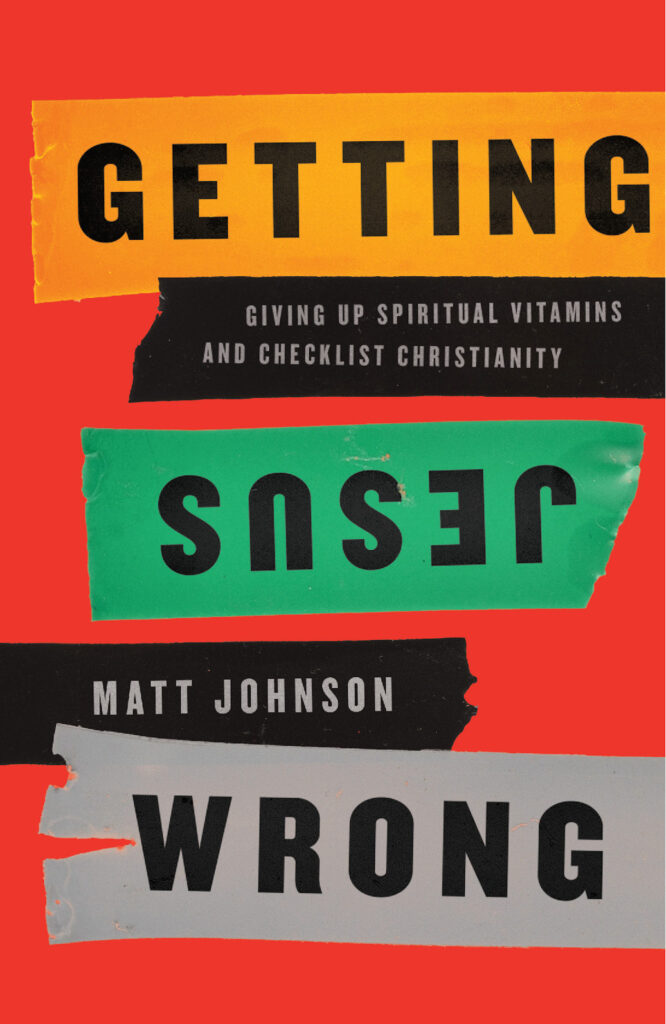One day the Rich Young Ruler (let’s call him Chet) comes to Jesus and says, “Hey, good teacher, I’ve done pretty well for myself in life. I’m feeling blessed. I’ve worked hard, tried my best to do what’s right and give back to the community. But, you know, Jesus, I just need to make sure I’ve done everything as thoroughly as I should. What’s the one thing I need to do to have eternal life?”
Have you ever asked what “one thing” you can do to make over your life? For me, this is related to knowledge. When an idea embeds into my brain, I scour every resource I can on the subject and devour it. I crave information because, for me, information unlocks the door of understanding, understanding is mastery, and mastery is freedom. Is that weird? You have your own version of this lively pursuit. You and I are not so different from the Rich Young Ruler. We’re all looking for mastery of some sort.
According to the text, the Rich Young Ruler had done pretty well at mastery. He’d obeyed the commandments as a matter of course ever since he was a child. That’s more than most of us can say. But while many of us can’t claim this kind perfection, maybe we’d settle for just “one thing” to master. We live in a sea of three-simple-steps-to-a-successful-life programs. Books that claim you can conduct a thriving business in four hours a week. One thing that you can do to declutter and get your life back. The one daily exercise that will deliver six-pack abs. What each of these “one things” promises is that you’ll get your life back. It will make things easy, less stressful. The “one thing” promises success, happiness, and contentment in relationships. And yet, although people keep reading (and writing) these books, the problems are never really solved. Instead, it seems to me that depression is on the rise, that people are more stressed and less sure of their place in the world than ever before. So much for that “one thing” fixing our lives.
Whether we’re looking for career advice, tips for healthy living, or principles for a deeper, more devoted and heartfelt faith, we all have fallen for these “one thing” activities or experiences. I beat my head against the wall chasing after reading one-year Bible devotions, attending a revival event, listening to all the anointed teachers who could help me unlock my destiny, and devouring a stack of books. Just like the Rich Young Ruler who needed to ensure his spiritual life was all it could be, we need to feel as though we’re doing something good for ourselves—that we’re progressing and maturing. See, we’re not that different from the Rich Young Ruler after all. How about you? What’s your one thing?
Winning the Checklist
Let’s look back at Jesus’s short exchange with the Rich Young Ruler again.
And behold, a man came up to him, saying, “Teacher, what good deed must I do to have eternal life?” And he said to him, “Why do you ask me about what is good? There is only one who is good. If you would enter life, keep the commandments.” He said to him, “Which ones?” And Jesus said, “You shall not murder, You shall not commit adultery, You shall not steal, You shall not bear false witness, Honor your father and mother, and, You shall love your neighbor as yourself.” (Matthew 19:16–19)
The young man asked Jesus the path to eternal life. Jesus’s response seems almost parochial: love God and love your neighbor, keep all the Ten Commandments. The Rich Young Ruler was looking for that leg up on all the mundane commandments business, a key to the higher life. Jesus’s initial response must have been disappointing to the young man. Essentially, Jesus said do all the stuff you say you’ve already been doing. The Rich Young Ruler was looking to climb up to spiritual success. Jesus might as well have crumpled up his checklist and thrown it into the trash.
Though we can’t know with complete accuracy this man’s inner thoughts or intentions, he went away deflated, unable to obey Jesus’s commands. Until then he’d found his way upstream and was enjoying a prestigious career as some sort of ruler. Maybe he’d hoped that Jesus would give him another checklist he could succeed with, climb up with and attain. What happens next is a surprise.
The Kindness of Back-Breaker Jesus
Though I quoted the passage from Matthew 19 above, I really like the commentary the Gospel of Mark adds after the Rich Young Ruler responds with, “I’ve kept all the religious rules since I was a kid.” Mark 10:21 says, “And Jesus, looking at him, loved him . . .” (italics mine). Get that? Jesus loved him. Guess what Jesus does next? He loves the Rich Young Ruler by breaking his back with the weight of an impossible task: sell all you have and give it all to the poor and follow me.
“You know what, Chet? There is one thing that you lack. How about you sell the house, the BMW, and your Jet Ski? You go into the office tomorrow, quit the firm, and sell off your portion of the partnership. Once the check clears, you go and disperse all that money to the poor. Go to the gospel mission—you know the one in the seedy part of downtown—cut them a big fat check. You’re an upstanding guy, so I know you can do it. After that, come right back here and follow me. One thing though—I’m homeless. Well, actually I sleep under the interstate bridge down in the valley. And crowds of needy people are always hounding me, and I don’t always have time to eat . . .”
Poor Chet! That was a price he didn’t expect to pay. Chet had worked hard in life in order to always be on top. The list Jesus gave him in his second response was utterly undoable because it didn’t involve Chet winning, but him losing. So Chet went away sad.
Some believe that Jesus was delivering a prescriptive word to all believers—that all believers should be more committed to the poor and live simply so that others may simply live. There’s something good to be gleaned from that idea. However, I think Jesus was doing something more profound here.
Rather than being a prescriptive text, this is a descriptive text based on what Jesus knew the Rich Young Ruler needed in the moment. Jesus set the bar so high that there was no place to go but down. Jesus set the Rich Young Ruler free to lose for once in his life. He’d been living a life based on winning and achieving up to that point. Imagine if Jesus had just given him a religious chore list. He would have checked all those items off the list, perhaps feel self-justified in his achievement, and trudged back to Jesus for another morale boost. The Rich Young Ruler expected to get a checklist in order to win at what he perceived he was already winning at! Jesus was preparing the Rich Young Ruler for something good that, unfortunately, he didn’t seem to stick around to hear.
The One Thing = Nothing
Jesus calls us to a life of radical commitment and obedience to him, no doubt. And if we’re honest with ourselves, we know we’re not living up to the demand; to be a disciple is to live within that tension. If we were living up to those high demands, we wouldn’t need Jesus. The one thing we truly lack in the Christian life is—nothing.
A few verses later, Jesus addresses the disciples, “‘Children, how difficult it is to enter the kingdom of God! It is easier for a camel to go through the eye of a needle than for a rich person to enter the kingdom of God.’ And they were exceedingly astonished, and said to him, ‘Then who can be saved?’” (Mark 10:24–26). Jesus’s disciples were a bunch of working class, ragtag jokers. A well-educated, culturally savvy, and influential person with money would have come in handy. The Rich Young Ruler would have been a welcomed addition to the posse. Yet Jesus says getting Chet into heaven is like getting a camel through the eye of a needle. Translation: it’s impossible. Fortunately, this isn’t the end of the scene.
Jesus looked at them and said, ‘With man this is impossible, but with God all things are possible’” (Matthew 19:26). The Rich Young Ruler couldn’t bring anything with him into that exchange with Jesus. Not his wealth, his title as a ruler, or his moral report card. What he didn’t have was nothing. When we go looking to accomplish that one thing in our lives that we believe will make life complete, we are unknowingly on a path of self-justification. I’m convinced that there is something deeply ingrained in human beings that seeks self-justification. Even beyond the solid-gold theological reality of justification, whether you are a believing person or not, we all feel a deep-seated need to be told, or at least to believe within ourselves, that somehow we’re OK. We want to know that, despite our flaws, in the end our failings aren’t the last word about who we are.
This nothing is something Jesus can work with. There’s no moral transaction from you that needs to take place in order for Jesus to draw near. No trophy on the shelf, no stack of egghead books to consume, no fat paycheck to earn, no academic credentials to achieve, not even an act of social justice performed. Jesus takes you and me just as we are. He takes the scabs, bruises, the 2 a.m. indiscretions, and all. Fortunately for you and me, God loves and accepts us despite our self-justifying behaviors. In that moment of self-justification in front of the church all those years ago, I couldn’t have been any more loved by God than I already was and am. To know that I am always unconditionally loved carries with it a great sense of relief. The pressure’s off.
Excerpted adapted from Getting Jesus Wrong: Giving Up Spiritual Vitamins and Checklist Christianity ©2017 by Matt Johnson. May not be reproduced without prior written permission.
GETTING JESUS WRONG: GIVING UP SPIRITUAL VITAMINS AND CHECKLIST CHRISTIANITY
The truth is, we all want something from Jesus. Some are just hoping for a little help to get through life—a new direction, a purpose that will get us up in the morning, an exercise plan, a way to get organized. But that approach to Jesus doesn’t result in real faith or love.
This book is available for sale at your favorite Christian book store.






